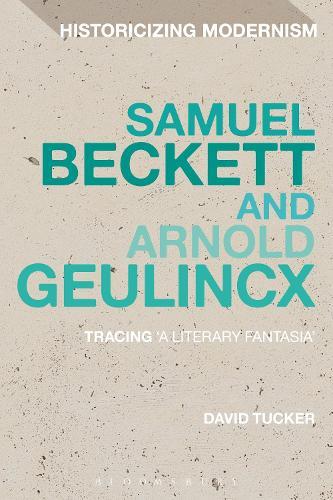Overview
amuel Beckett once wrote that were he in the ‘unfortunate position' of a critic studying his work, one of his points of departure would be the ideas of the 17th-century philosopher, Arnold Geulincx. Samuel Beckett and Arnold Geulincx: Tracing ‘a literary fantasia' is the first full-length study to document the extent of the influence Geulincx's philosophy had on Beckett's prose and late drama. Establishing itself as a reference point for Beckett's published and unpublished writings, David Tucker's study presents a clear, chronological exploration of Beckett's engagement with Geulincx, and of how this engagement marks, and is marked by, broader changes in Beckett's aesthetic thinking. By positioning close, interpretative philosophical readings alongside analyses of archival materials, Tucker sets out an affirmative and reconciliatory approach to divergent strands in contemporary Beckett Studies.
Full Product Details
Author: Dr David Tucker (Goldsmiths, University of London, UK)
Publisher: Bloomsbury Publishing PLC
Imprint: Bloomsbury Academic
Edition: NIPPOD
Dimensions:
Width: 15.60cm
, Height: 1.20cm
, Length: 23.40cm
Weight: 0.297kg
ISBN: 9781472524072
ISBN 10: 1472524071
Pages: 240
Publication Date: 16 January 2014
Audience:
Professional and scholarly
,
Professional & Vocational
Format: Paperback
Publisher's Status: Active
Availability: Manufactured on demand

We will order this item for you from a manufactured on demand supplier.
Reviews
'Everynow and again, rarely, a book comes along that offers a definitive account of aparticularly vexing critical question - this study is one of them. Drawing on arange of published and unpublished materials, David Tucker offers acomprehensive and sensitive examination of the role Geulincx plays in Beckett'swriting and aesthetics, and in doing so makes us think differently aboutBeckett's work.' -- Mark Nixon, Director, Beckett International Foundation, and Lecturer, University of Reading, UK 'SamuelBeckett's debt to Arnold Geulincx has been recognized on occasion, as it were,but this is the first detailed treatment of its lasting impact. David Tuckertraces Beckett's early readings of the Belgian post-Cartesian philosopher fromtheir manifest presence in Murphy (1938), through their moresubtle intimations in the great writings of the 1940s, to their faint stirringsin the later prose, showing that Geulincx's Ethica and theircentral axiom, ubi nihil vales, ibi nihil velis, continued to define forBeckett a viable ethical principle in a worthless world.' -- Professor Chris Ackerley, University of Otago, New Zealand
'Everynow and again, rarely, a book comes along that offers a definitive account of aparticularly vexing critical question - this study is one of them. Drawing on arange of published and unpublished materials, David Tucker offers acomprehensive and sensitive examination of the role Geulincx plays in Beckett'swriting and aesthetics, and in doing so makes us think differently aboutBeckett's work.' -- Mark Nixon, Director, Beckett International Foundation, and Lecturer, University of Reading, UK 'SamuelBeckett's debt to Arnold Geulincx has been recognized on occasion, as it were,but this is the first detailed treatment of its lasting impact. David Tuckertraces Beckett's early readings of the Belgian post-Cartesian philosopher fromtheir manifest presence in Murphy (1938), through their moresubtle intimations in the great writings of the 1940s, to their faint stirringsin the later prose, showing that Geulincx's Ethica and theircentral axiom, ubi nihil vales, ibi nihil velis, continued to define forBeckett a viable ethical principle in a worthless world.' -- Professor Chris Ackerley, University of Otago, New Zealand One of the merit's of Tucker's study is that it bolsters a careful consideration of the historical and the archival evidence with a close attention to the texture of Beckett's texts. Just as important, it attempts an evenhanded appraisal of previous readers' under- and over-estimation of Geulincx's significance for Beckett...The most well-researched account of Beckett and Geulincx that we are likely to get...Tucker's study succeeds admirably in this regard, and in doing so performs a long-overdue service to Beckett studies. Accordingly, this book will also serve as a key reference point for the fast-growing body of scholarship on Beckett and philosophy more broadly. -- John Bolin, University of Exeter College Literature
Author Information
David Tucker is a Visiting Research Fellow at the University of Sussex and currently teaches at the University of Oxford, UK. He is the editor of British Social Realism in the Arts since 1940 (Palgrave, 2011).




